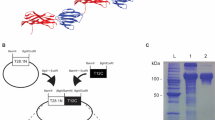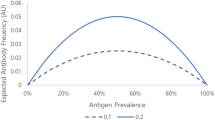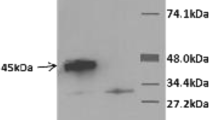Abstract
DATA concerning the quantity of cells which synthetize two kinds of antibody simultaneously are contradictory1–3. The kinetics of such cells has not been extensively investigated. Accordingly, we have attempted to investigate the effect of the number of antigens used for immunization on the quantity of cells synthetizing more than one kind of antibody. For this purpose, several groups of Wistar rats were given single subcutaneous injections, in both hind foot pads, of endotoxins from Salmonella cerro, S. aberdeen and Shigella flexneri in different combinations. The dose of each of the antigens was 5 µg/injection. The animals were killed 5 days after the injection of antigen and cell suspensions prepared from the tissues of their popliteal lymph nodes4 were assayed for antibody producing cells. The assays were carried out by techniques of motile bacteria adherence5 and indirect haemadsorption6. Test antigens utilized for the first procedure were live cultures of active motile S. cerro or S. aberdeen bacteria and those used for the second procedure were small round sheep erythrocytes or large dog erythrocytes sensitized by specific antigens. In control experiments, designed to verify the specificity of the chosen tests, the cells of the animals immunized with only one antigen were checked by all three test antigens. To rule out the possibility of passive “induction” of adherence reactions, cells of intact animals treated with serum or saline extracts of lymph nodes of immunized rats have also been tested. The results of the control experiments have shown that the techniques used are of adequate specificity.
This is a preview of subscription content, access via your institution
Access options
Subscribe to this journal
Receive 51 print issues and online access
$199.00 per year
only $3.90 per issue
Buy this article
- Purchase on Springer Link
- Instant access to full article PDF
Prices may be subject to local taxes which are calculated during checkout
Similar content being viewed by others
References
Nossal, G. J. V., Adv. Immunol., 2, 163 (1962).
Attardi, G., Cohn, M., Horibata, K., and Lennox, E. S., J. Immunol, 92, 335 (1964).
Shwartzman, Ja. S., Karpov, M. K., and Zuev, A. S., Zh. Mikrobiol. Epidemiol. Immunol., 10, 43 (1964).
Shwartzman, Ja. S., Bull. Exp. Biol. Med., 12, 88 (1964).
Mäkelä, O., and Nossal, G. J. V., J. Immunol., 87, 447 (1961).
Shwartzman, Ja. S., and Ispolatova, A. V., Bull. Exp. Biol. Med., 5, 121 (1966).
Ingraham, J. S., and Bussard, A., J. Exp. Med., 119, 4 667 (1964).
Fridman, H., Proc. Soc. Exp. Biol. and Med., 117, 2, 256 (1964).
Schwartz, S. A., and Braun, W., Science, 149, 200 (1965).
Landy, M., Sanderson, R. P., and Jackson, A. L., J. Exp. Med, 122, 483 (1965).
Author information
Authors and Affiliations
Rights and permissions
About this article
Cite this article
SCHWARTZMAN, J. Effect of the Number of Antigens on the Quantity of Cells producing Several Kinds of Antibody. Nature 213, 925–926 (1967). https://doi.org/10.1038/213925a0
Received:
Published:
Issue Date:
DOI: https://doi.org/10.1038/213925a0
This article is cited by
-
Cellul�re Aspekte der Antik�rpersynthese
Klinische Wochenschrift (1969)
Comments
By submitting a comment you agree to abide by our Terms and Community Guidelines. If you find something abusive or that does not comply with our terms or guidelines please flag it as inappropriate.



